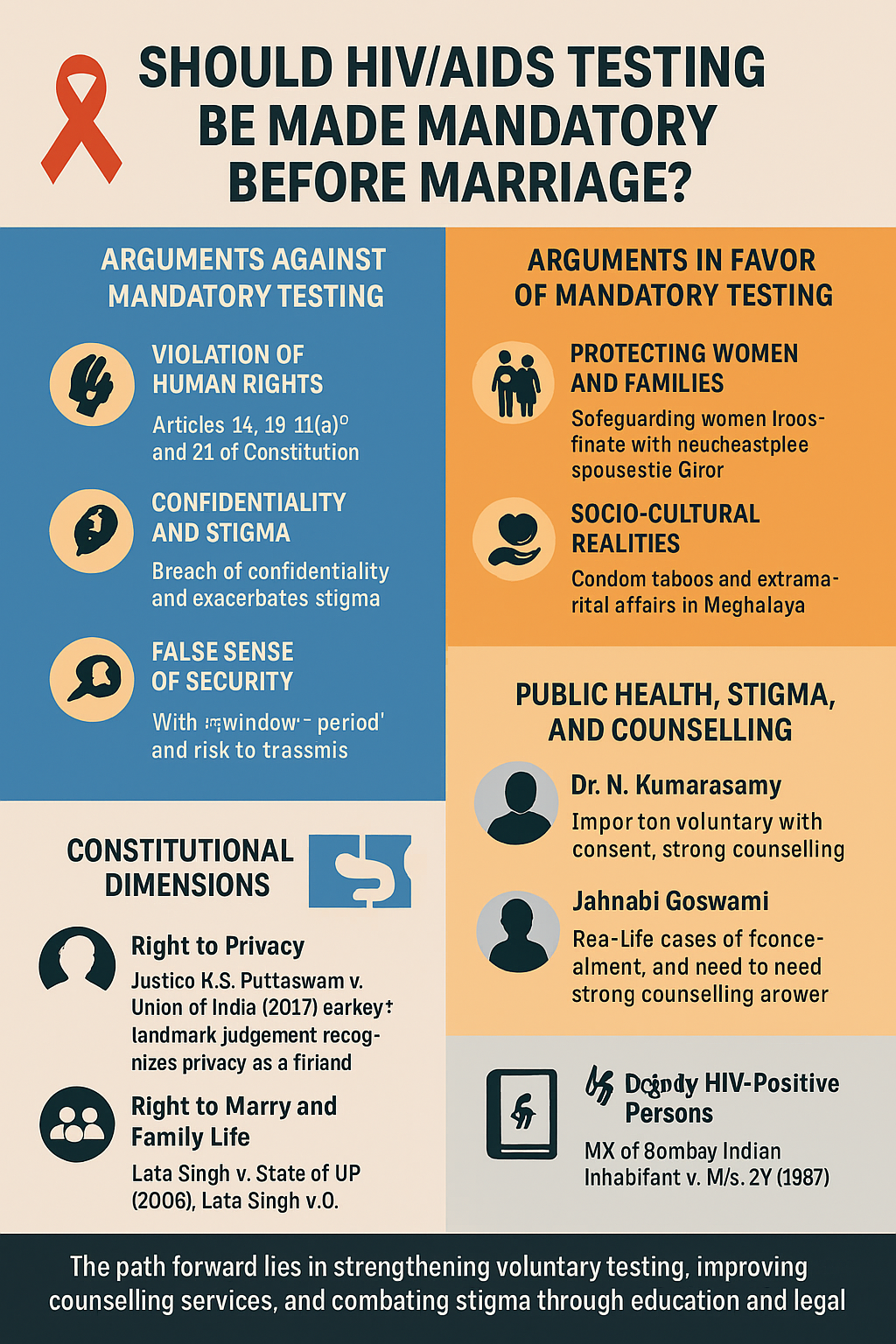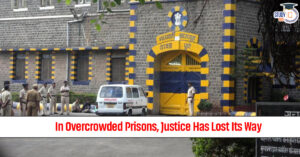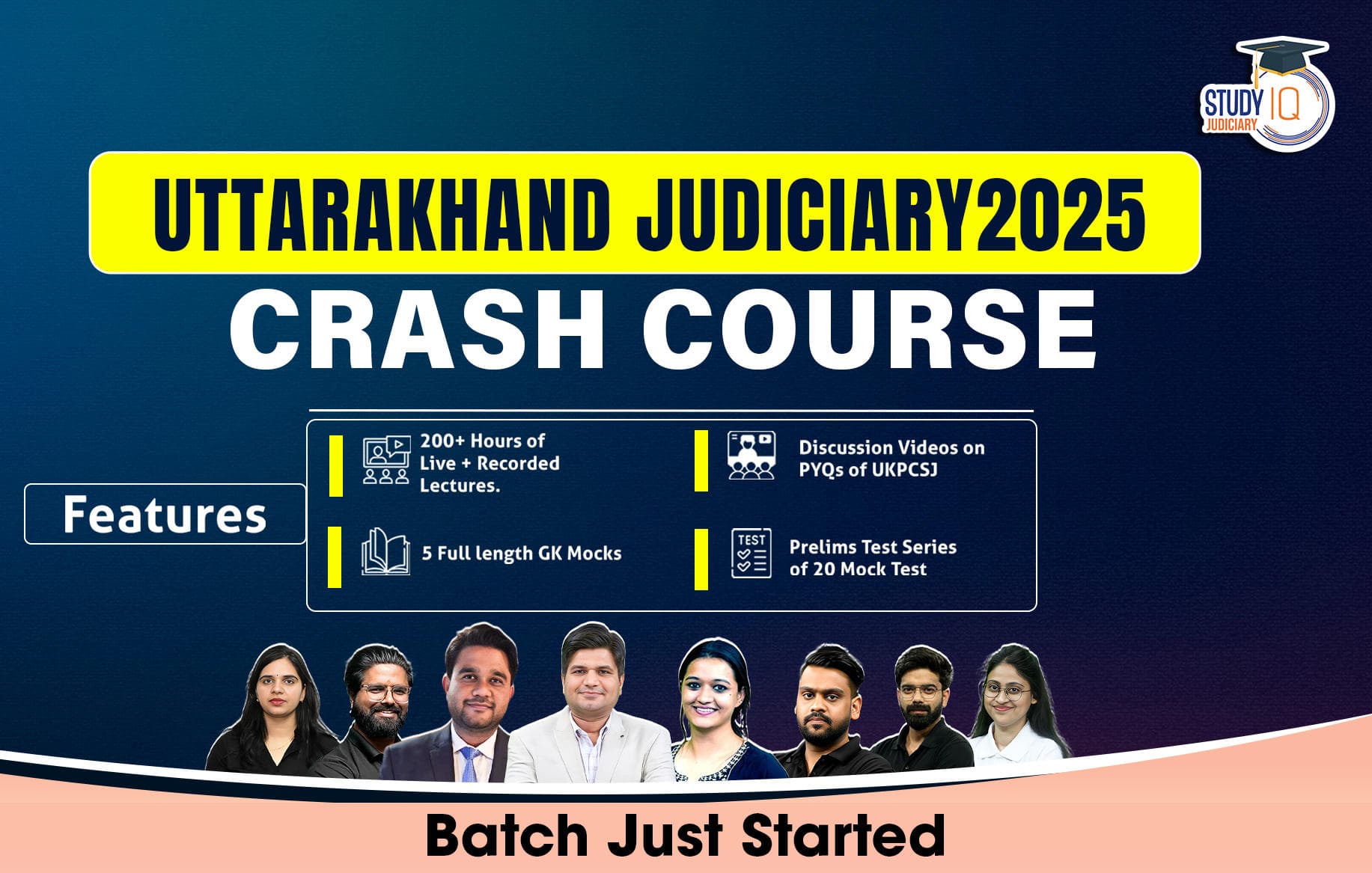Table of Contents
The discourse around the required nature of HIV/AIDS testing before marriage is intricately nuanced, situated at the confluence of public health, individual autonomy, human rights, and socio-cultural contexts. In July 2023, Meghalaya’s Health and Family Welfare Minister, Mazel Ampareen Lyngdoh, declared that the State might adopt Goa’s policy of requiring HIV/AIDS testing before marriage.
Although the action seems to be precautionary and focused on welfare, the matter cannot be assessed exclusively from a health perspective. It encompasses issues of human dignity, privacy, autonomy, stigma, women’s empowerment, and the fundamental tenets of constitutional morality.

Legal and Policy Framework: HIV and AIDS (Prevention and Control) Act, 2017
- The HIV and AIDS (Prevention and Control) Act, 2017, is a significant law in India that clearly safeguards the rights of those afflicted with HIV/AIDS.
- It forbids discrimination in employment, education, healthcare, insurance, and access to public amenities. Significantly, it requires:
-
- Pre-test counselling and informed consent before any HIV testing.
- Confidentiality regarding HIV status.
- The Act permits HIV-positive individuals to marry without discrimination.
- Availability of treatment, encompassing complementary antiretroviral therapy (ART).
Dr. Kumarasamy asserts that mandating testing would clearly breach this Act by infringing up on the concepts of consent and confidentiality, while also exacerbating the stigma.
Arguments Against Mandatory Testing
1. Infringement of Human Rights
Compulsory HIV testing violates fundamental rights enshrined in the Indian Constitution, specifically:
- Article 14 (Right to Equality) asserts that compulsory testing discriminates against individuals who are HIV-positive in the context of marriage.
- Article 19(1)(a) (Freedom of Choice and Expression) indicates that individuals are deprived of autonomy regarding personal decisions such as marriage.
- Article 21 (Right to Life and Personal Liberty), which the Supreme Court has broadly construed to encompass the rights to privacy, dignity, and bodily integrity.
2. Privacy and Stigmatisation
- Mandating HIV testing would violate confidentiality, resulting in potential exposure and social ostracism. Historically, stigma in India originated when HIV was initially identified among sex workers and then linked to drug use. Such links sustain falsehoods, prejudice, and the marginalisation of individuals with HIV.
3. False Sense of Security
- A negative test result does not necessarily indicate the complete absence of infection, owing to the “window period” that exists between exposure and detectability. Mandatory testing, if conducted without adequate counselling, may impart a misleading sense of security to couples and prove ineffective in preventing the transmission of the disease.
4. Insights from Goa
- Goa’s initial plan for mandatory premarital HIV testing was never enacted. Instead, extensive voluntary testing was conducted. This illustrates the logistical obstacles and constitutional issues associated with mandating such testing.
Arguments in Favour of Mandatory Testing
1. Protecting Women and Families
- Activist Jahnabi Goswami contends that compulsory testing might protect women, especially in the northeast, where intravenous drug use constitutes approximately 64% of HIV cases. Men who hide their HIV status and marry due to familial pressure jeopardise the health of their spouses and future offspring. In such instances, compulsory testing guarantees transparency and mitigates exploitation inside marriage.
2. Socio-Cultural Dynamics
- In Meghalaya, where using contraception is seen as taboo by certain segments of the Christian community, and where extramarital affairs and cohabitation are quite prevalent, the danger of HIV transmission is exacerbated. In light of these circumstances, Goswami asserts that compulsory testing could function as a precautionary strategy.
3. Empowerment of Women via Awareness
- Although not explicitly portrayed as women’s empowerment, mandatory testing could indirectly save women from becoming victims of marital fraud. Given that stigma frequently hinders disclosure, premarital testing may furnish women with essential information before entering marriage.

Public Health, Stigma, and Counselling
- Although both experts recognise the stigma associated with HIV, they differ in their proposed solutions. Kumarasamy promotes voluntary testing accompanied by informed consent and robust counselling frameworks, emphasising that U=U (Undetectable = Untransmittable) must be integral to public awareness initiatives. The scientific fact that an individual with an undetectable viral load cannot transmit HIV can diminish stigma and promote regular testing.
- Conversely, Goswami emphasizes actual instances of concealment, wherein women learn of their partner’s HIV status solely post-marriage. She advocates for enhanced counselling frameworks in conjunction with mandatory testing, ensuring individuals comprehend both the risks and the scientific progress in HIV treatment.
Constitutional Dimensions
The debate should be analysed through the lens of constitutional morality and the Supreme Court’s progressive legal principles.
- Right to Privacy (Justice K.S. Puttaswamy v. Union of India, 2017) The pivotal ruling acknowledged privacy as inherent to Article 21. Compulsory HIV testing would infringe upon this right by compelling individuals to reveal confidential health information.
- The freedom to Marry and Family Life – While not clearly articulated, the Supreme Court has determined in judgments such as Lata Singh v. State of UP (2006) that the freedom to marry an individual of one’s choosing is fundamental to Article 21. The HIV status cannot serve as a legal basis to prohibit marriage.
- The Dignity of Individuals Living with HIV (MX of Bombay Indian Inhabitant v. M/s. ZY, 1997). The Bombay High Court determined that the refusal of work to an HIV-positive individual infringed upon their dignity and right to earn a living. The same rationale pertains to marriage: compulsory testing diminishes dignity and autonomy.
Role of the Judiciary in India and the International Context
- The Indian judiciary has been instrumental in reconciling public health with fundamental rights.
- Judicial bodies have regularly determined that public health initiatives cannot supersede constitutional protections of privacy, dignity, and equality.
- The United Nations Programme on HIV/AIDS (UNAIDS) and the World Health Organisation (WHO) internationally advocate against mandatory HIV testing, underscoring the need for voluntary, informed, and confidential testing as optimal practices worldwide.
- Countries that implemented mandatory testing, such as China in the 1990s, ultimately discontinued the practice due to abuses of rights and lack of efficacy.
- By conforming to international standards, Indian courts have affirmed that HIV constitutes a health condition rather than a basis for discrimination.
- The judiciary recognises India’s international obligations under the ICCPR and ICESCR, which safeguard dignity, familial rights, and non-discrimination.
The Way Forward
- The debate indicates that a compromise is essential:
-
- Enhancing volunteer HIV testing initiatives through effective counselling.
- Enhancing awareness initiatives around U=U to mitigate stigma.
- Providing gender-sensitive counselling to safeguard women in at-risk communities.
- Drawing insights from Tamil Nadu and Kerala, where extensive voluntary testing and ART links have effectively diminished transmission rates.
- The issue of mandatory HIV testing before marriage highlights essential conflicts between personal rights and public health requirements.
- Although mandatory testing may seem to safeguard women and families, it jeopardises the fundamental norms of consent, confidentiality, and dignity, which are upheld by both Indian and international law.
- A more sustainable strategy involves enhancing voluntary testing, augmenting counselling services, and addressing stigma through education and legal safeguards.
- The judiciary’s role, both in India and worldwide, is essential in ensuring that public health initiatives align with constitutional principles and human rights.
- The future should prioritise empowerment over coercion, enabling individuals to be informed, supported, and free to make decisions devoid of fear or discrimination.


 Warring Couples Cannot Make Courts Their...
Warring Couples Cannot Make Courts Their...
 Tackling Child Trafficking in India: Leg...
Tackling Child Trafficking in India: Leg...
 In Overcrowded Prisons, Justice Has Lost...
In Overcrowded Prisons, Justice Has Lost...



















